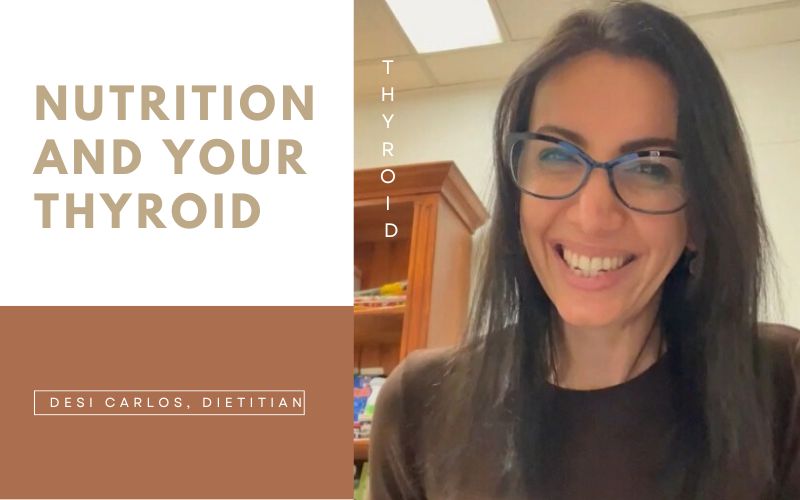
Can diet affect thyroid function? Yes, it absolutely can! Generally speaking, our thyroids need certain nutrients in order to function well. And while there’s nothing specific that harms it, there is a whole range of foods that can support thyroid health. Find out all about the thyroid and what symptoms might be telltale signs yours isn’t working well. Also, find out what nutrients we need and the overall best diet to support good thyroid health. Not only is this subject close to my heart on a professional level, but on a personal one too. While diet could not have prevented my thyroid disease, it has been the most helpful tool I have to manage it. So let’s dive into thyroid nutrition, shall we?
My story
Several years ago, I was at my absolute wit’s end with my health. At age 40, I began to experience a baffling set of symptoms. What seemed like overnight, I started to experience anxiety, depression, heart palpitations and the good old brain fog. I had no idea what was going on. I knew I was overstretched…but it felt like something else. Then, I started to experience weakness in my joints and pain in my legs. That was frightening. I saw lots of doctors, but no one could find what was wrong with me. On top of the existing symptoms, which believe me, were bad enough, also came some IBS symptoms. Bloating, gut irritation and weight gain, I felt tired all the time, and was also having trouble sleeping. I really felt like I was broken. I knew that something more was wrong, but my bloodwork didn’t show abnormal TSH, which is the typical marker for a thyroid issue.
However, after many different tests, I was finally diagnosed with Hashimoto’s disease. That’s an autoimmune condition classified by an underactive thyroid. Once diagnosed, I turned to nutrition to support my condition and can testify that diet can affect thyroid function. The good part of knowing that is being able to positively influence our outcomes. And that feels good.
So let’s backtrack a little bit now…how do you recognise a thyroid issue in yourself?
Do you have a thyroid issue?
The thyroid, a small butterfly-shaped gland at the base of the throat, has quite an important job to do. It makes and releases hormones that control your body’s metabolic processes. This includes your heart rate, blood pressure, body temperature and weight. So when it’s not working well, we are going to experience a few symptoms in those areas. These relate to the two types of thyroid conditions, an underactive thyroid (hypothyroidism) or an overactive thyroid (hyperthyroidism).
Symptoms

Overactive thyroid can produce symptoms of:
- Anxiousness or nervousness
- Heat intolerance
- Tiredness
- Weight loss
- Heart palpitations (tachychardia)
Underactive thyroid can produce these symptoms:
- Fatigue
- Weight gain
- Cold intolerance
- Forgetfulness
- Depression
- Constipation
- Dry skin
Sometimes, we can experience a bit of both sides, particularly with Hashimoto’s disease.
According to the Australian Thyroid Foundation, about 1 million Australians are living with an undiagnosed thyroid condition and it is ten times more common in women than men. Thyroid symptoms can be varied and can also be quite similar to other medical conditions. The only way to know for sure is through medical examination including extensive blood testing and scans. If you think you may have a thyroid problem, it’s important to see your doctor.
Causes
There are varied causes for thyroid disorders, including:
- iodine deficiency
- autoimmune diseases, leading either to hyperthyroidism (Graves’ disease) or hypothyroidism (Hashimoto’s disease)
- inflammation caused by a virus or bacteria
- nodules, or non-cancerous lumps
- cancerous tumours
- radiation therapy, thyroid surgery, and some medicines
- genetic disorders
- Occasionally, pregnancy can cause thyroid problems to start or get worse. (Healthdirect)
How can diet affect thyroid function?
Nothing you specifically eat affects the thyroid. However, diet can affect thyroid function in terms of supporting our micronutrient requirements for a healthy thyroid. It is important to have a good balance of key vitamins and minerals that are usually available from food.
The four key nutrients for good thyroid function.
- Selenium is a key nutrient in our diet. It is essential to thyroid hormone metabolism, DNA synthesis and reproduction. Selenium is found in seafood, whole grain breads and cereals, and is also found in Brazil nuts.
- Iodine is essential for production of the thyroid hormone. Iodine deficiency is the most common cause of thyroid disorders worldwide and is growing here in Australia. Iodine is present in sea water, and in the soil in varying degrees. The best source of iodine is seafood. Unless you are seriously deficient, we don’t recommend supplementation.
- Zinc can not only influence the thyroid, it also influences immunity. Good zinc levels help with anxiety and also fortifying the lining of the gut. Zinc is found in meat, predominantly chickpeas as well. With zinc though, if you’re not really a meat eater and you don’t like legumes that much, then supplementation is required.
- Vitamin D deficiency is increasingly associated with thyroid disorders. There is growing evidence of an association of Vitamin D deficiency and autoimmune thyroid disease and in particular, Hashimoto’s Disease. If you have a predisposition to thyroid issues, Vitamin D deficiency can also exacerbate it. Vitamin D is found naturally in oily fish, egg yolks, and mushrooms.
Watch my video below all about nutritional support for thyroid disorders.
Auto-immune thyroid disorders
Graves Disease is an autoimmune disease where you suffer from hyperthyroid (over active). Graves has a medical basis, and should predominantly be dealt with by an endocrinologist. However, there are nutritional aspects, especially deficiency states that can be supported with a good diet.
Hashimotos is also an autoimmune disease presented as an underactive thyroid (hypothyroid). Again, we can’t do much with diet to fix any family history, but we can work to support any deficiencies. We also work to reduce the inflammation that makes you feel inflamed and often fatigued. High on the list is working out what foods are causing the inflammatory responses. Uncovering what is causing your problems and how we can improve your thyroid antibodies.
How to boost thyroid function with diet
Want to know how to boost thyroid function with diet? The Mediterranean Diet is one of the most improving factors when it comes to dealing with thyroid disorders. The Mediterranean Diet is an anti-inflammatory diet, and so it is incredibly beneficial for supporting autoimmune diseases relating to the thyroid. Thyroid conditions can also cause symptoms of irritable bowel syndrome. And on the flip side, a lack of nutrient absorption associated with IBS can also exacerbate deficiency states that can lead to thyroid conditions, particularly if you have a predisposition.
Our first port of call is a specialised protocol for gut health, which helps to restore the gut lining and decrease intestinal permeability. We support this with the Mediterranean Diet, which helps to fuel the gut microbiome and decrease inflammation in the body and the thyroid. So, it’s a wonderful web of nutritional support for thyroid disorders.

Try it for yourself
Get a sample of delicious recipes based on the scientifically backed Mediterranean Diet. Our free recipe book will show you how to take good produce and create easy, family-friendly and super tasty meals.
Nutritional support for your thyroid health
It might take a bit of detective work for you, as it did for me. My detective work also led me to come up with a robust protocol for Hashimoto’s which I share with my patients who are experiencing the same thing. Come and see one of our dietitians specialising in the Mediterranean Diet and autoimmune disease. Get tailored nutritional support for your condition.
DISCLAIMER:
The content in this article is not intended as medical advice. It is also of a general nature and is not tailored to your individual circumstances. If you are experiencing significant thyroid symptoms please contact your G.P. And for specific and tailored information on thyroid nutrition, a 1:1 consultation is always the best approach. Please contact our clinic to discuss your unique situation.
Photo by National Cancer Institute on Unsplash

